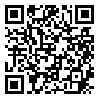BibTeX | RIS | EndNote | Medlars | ProCite | Reference Manager | RefWorks
Send citation to:
URL: http://hii.khu.ac.ir/article-1-2444-en.html

 , Reza Hassanzadeh
, Reza Hassanzadeh 
 , Zahra Safaei
, Zahra Safaei 
 , Omran Ghorbani
, Omran Ghorbani 
 , Ali Akbar Dastjedrdi
, Ali Akbar Dastjedrdi 
 , Somayeh Parvin
, Somayeh Parvin 

Abstract
Background and Aim: Research was carried out as a survey utilizing a researcher made questionnaire. 1149 postgraduate students were selected to fill in the research questionnaire, and 837 questionnaires were sent back. Along with descriptive statistics, independent samples t test was used to examine the difference between groups and Pearson co-efficient to measure correlations of variables.
Findings: More than 60 percent of students evaluated electronic information resources as most valuable and responsiveness to their information needs. More than half of students were only after free search engines, databases and simple searches. Sixtey percent did not formulate their search languages and relied on trial and error to obtain pertinent information. Less than 40 percent of students prefer the databases subscribed by their university. Among different types of electronic documents, electronic papers were most popular amongst students. Most of retrieved documents were used for writing research papers. Seventy percent of students believed that in the case of cessation of electronic resources, their research activities will be hampered. Only 18 percent of students were intended to pay per access to electronic resources and most of them indicated that in the case of disconnection, they will try to find an alternative way of access.
Conclusion: Vis-à-vis the favored situation in science production of the country, in order to fulfill national scientific development strategies, secure access to electronic resources should be guaranteed.
| Rights and permissions | |
 | This work is licensed under a Creative Commons Attribution-NonCommercial 4.0 International License. |




